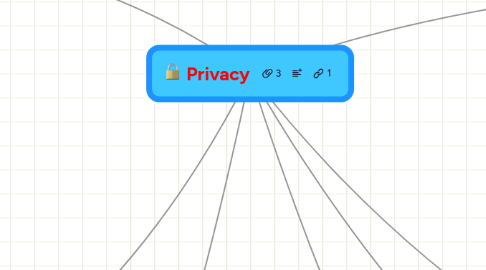
1. Physical
1.1. Defined by UTS
1.2. Fourth Amendment
2. Origins
2.1. Role of Legal System
2.1.1. Zones of Privacy
2.1.2. Fourth Amendment
2.1.3. First Amendment
2.2. Court Cases
2.2.1. Olmstead V. United States
2.2.1.1. First Constitutional use of "Privacy"
2.2.1.2. "wire tapping" considered unconstatutional
2.2.2. United States V. Chadwick
2.2.2.1. Arkansas V. Sanders
2.2.2.2. Extended right of physical privacy
2.2.2.3. Strengthened fourth amendment
3. Sources
3.1. Informational
3.1.1. Technology
3.1.1.1. (1) Technology Threatens Privacy
3.1.1.2. (2) Google Chrome
3.1.1.3. (11) Advancements threaten privacy
3.1.1.4. (12) Preface Does Technology Threaten Privacy
3.1.1.5. (13) CDT: Privacy Laws
3.1.1.6. (15) Human Nature Might Be Destroyed
3.1.1.7. (14) Louis Brandeis: Privacy Laws
3.1.2. Political
3.1.3. Sexual
3.1.4. Medical
3.1.5. Financial
3.2. General00
3.2.1. (3) National High School Debate Topic
3.2.2. (4) Privacy
3.2.3. (10) Intro to Privacy
3.3. Origins
3.3.1. (5) California v. Ciraolo
3.3.2. (6) Florida V. Riley
3.3.3. Minnesota V. Olson
3.3.4. (8) Meyer v. Nebraska
3.3.5. (9) Arkansas v. Sanders
3.3.6. Olmstead V. United States
3.4. Organizational
4. Proposed 2014 - Senate
4.1. Senate
4.2. Electronic Communications Privacy Act Amendments Act of 2013 (S.607, Leahy) Makes numerous amendments to ECPA, including eliminating the different warrant requirements that depend on whether communications were stored for fewer than, or more than, 180 days. Status: Reported by Committee, awaiting full Senate vote.
4.3. Restore Our Privacy Act (S.1168, Sanders) Makes numerous changes to the Foreign Intelligence Surveillance Act, including requiring Director of the Federal Bureau of Investigation (FBI) to apply for an order requiring the production of any tangible things only: (1) for an investigation to obtain foreign intelligence information not concerning a U.S. person; or (2) for an investigation concerning international terrorism. Status: Read twice and referred to the Committee on the Judiciary.
4.4. Do Not Track Online Act of 2013 (S.418, Rockefeller) Would require the Federal Trade Commission to create rules for the implementation of a mechanism that would enable an individual to “simply and easily indicate whether [the] individual prefers to have personal information collected by providers of online services” — in other words, a “Do Not Track” mechanism. Status: Read twice and referred to the Committee on Commerce, Science, and Transportation.
4.5. Healthcare Privacy and Anti-Fraud Act (S.1666, Rubio) Amends the Affordable Care Act to require privacy protections and training for safeguarding patient data. One of many bills introduced in the Senate and House to address privacy of information under the new healthcare law. Status: Read twice and referred to the Committee on Health, Education, Labor, and Pensions.
4.6. Drone Aircraft Privacy and Transparency Act of 2013 (S.1639, Markey) Amends the FAA Modernization and Reform Act of 2012 to provide guidance and limitations regarding the integration of drones into U.S. airspace. Similar bills have been introduced in the House. Status: Read twice and referred to the Committee on Commerce, Science, and Transportation
4.7. Password Protection Act of 2013 (S.1426, Blumenthal): Fines employers for requiring employees to provide the employers with their personal email or social media passwords. Similar legislation has been introduced in the House, and most states have either considered or enacted similar laws, of varying scope. Status: Read twice and referred to the Committee on Health, Education, Labor, and Pensions.
4.8. FISA Accountability and Privacy Protection Act of 2013 (S.1215, Leahy) Amends numerous provisions of the Foreign Intelligence Surveillance Act. One of many bills introduced in the Senate and House to reform FISA. Status: Read twice and referred to the Committee on the Judiciary.
4.9. Personal Data Privacy and Security Act of 2014 (S. 1897, Leahy) Expands civil and criminal penalties for data breaches and the misuse of personal information. Other members of Congress have introduced similar legislation, and more bills are expected in the wake of the retail data breaches. Status: Read twice and referred to the Committee on the Judiciary.
5. Information
5.1. Financial
5.1.1. Gramm-Leach Bliley Act
5.1.2. Right to Financial Privacy
5.1.3. Financial Privacy
5.2. Email Privacy Act (H.R. 1852, Yoder) Amends ECPA to prohibit a provider of remote computing service or electronic communication service to the public from knowingly divulging to any governmental entity the contents of any communication. Status: Referred to the Subcommittee on Crime, Terrorism, Homeland Security, and Investigations
5.3. Medical
5.3.1. HIPPA
5.3.2. Research
5.4. Sexual
5.4.1. Invasion of Sexual Privacy
5.4.2. Probably should stop there
5.5. Political
5.6. Technology
5.6.1. Hacker Hall Of Fame
5.6.2. Computer Laws
5.6.3. EPIC
